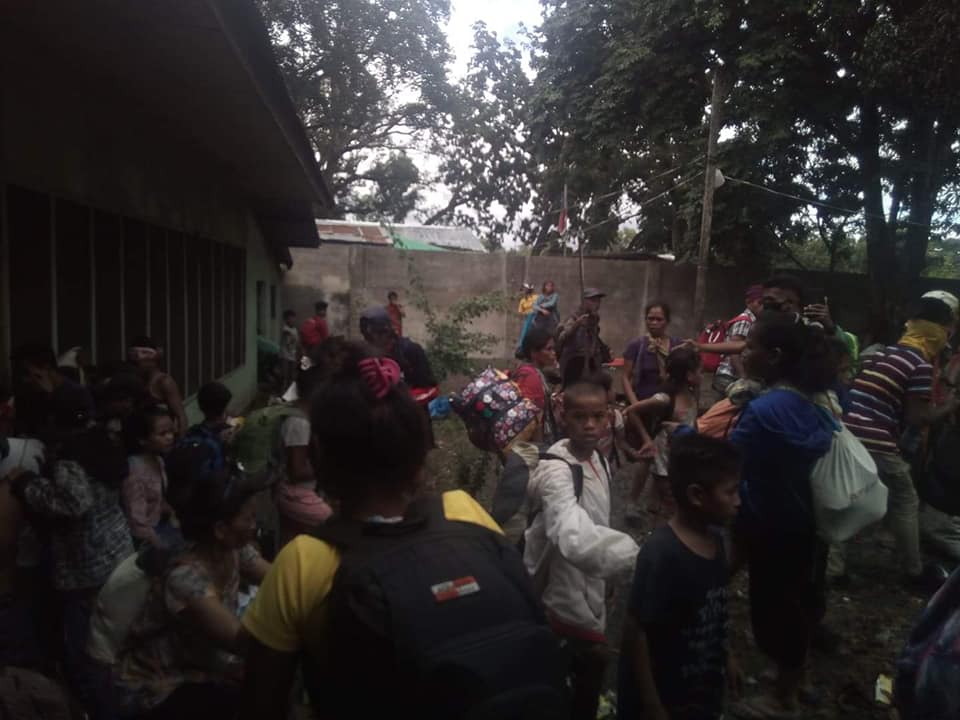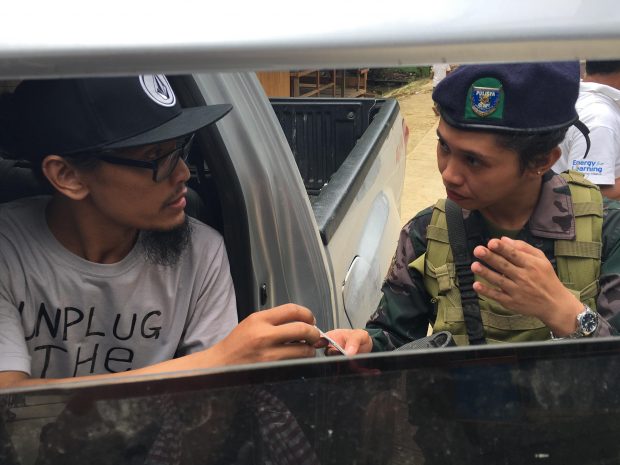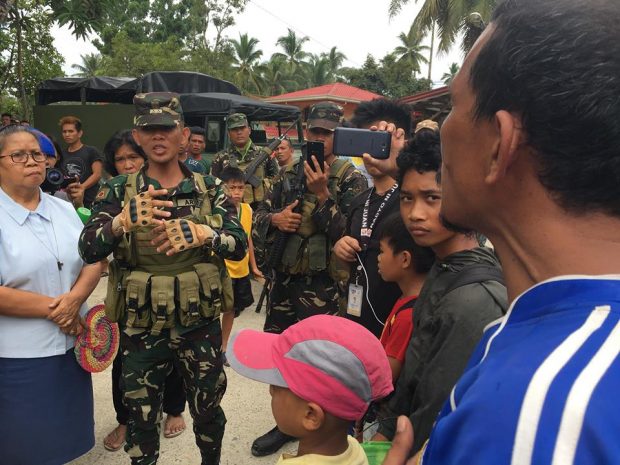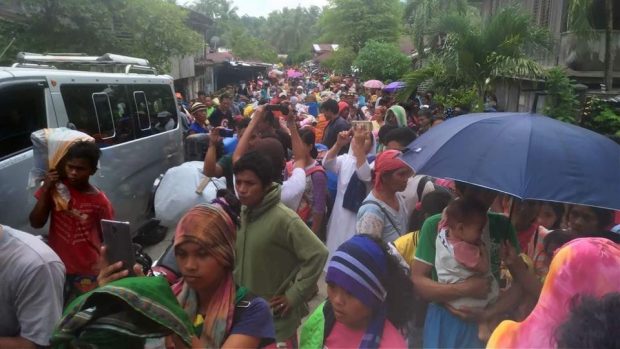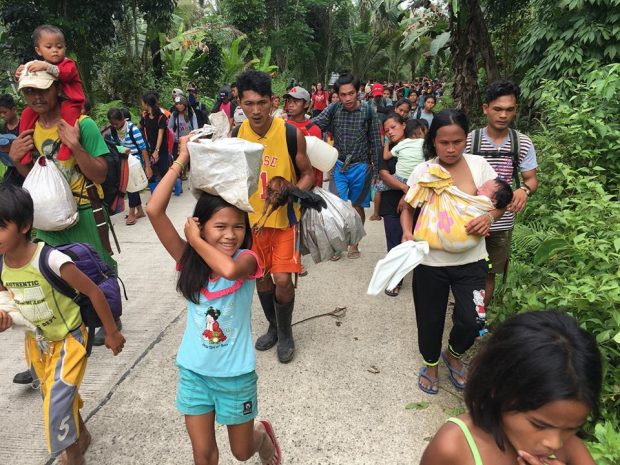BAI BIBYAON LIGKAYAN BIGKAY was early for the nine o’clock ceremony at the University of the Philippines-Diliman College of Social Work and Community Development (CSWCD) today. She sat at the front row of the hall, flanked by her two companions and interpreters, a Manobo Datu and a Catholic nun, patiently waiting for the people who are to present her the 2017 Gawad Tandang Sora.
There is little in her calm demeanor that showed she was aware the flurry of preparations in the entire hall was in her behalf, that the huge event was to hail her as the Melchora “Tandang Sora” Aquino of the current and troubled times. Ligkayan Bigkay is just the third recipient of the award given by the CSWD only during momentous occasions. The first awardee, the brave academic Prof. Flora Lansang who fought against Martial Law, was honored during UP’s centennial celebrations in 2008. The second awardee, Salve Basyang, tireless advocate of the rights and welfare of women and the elderly, was honored during the bicentenary celebrations of the birth of Tandang Sora in 2012.
There were fears the 92-year old third honoree (earlier reports of her age varied from 70 to more than a hundred) would not make it to the occasion because she had been ill. Sr. Noemi Degala, SMSM, one of her companions on the trip and interpreter, explained the Bai is complaining of joint pains. “It is most probably brought about by her advanced age,” Sr. Noemi said. But Bai Ligkayan made it, garbed in the traditional red and black Manobo dress and resplendent with the ginibang bead necklace and bead wristband. Unmarried, she still honors the Manobo tradition of wearing only two bead ornaments on her body, not even the tangkuro, exclusive to datus and chieftains like her. There were the inevitable requests for “selfies” with the guest of honor and she obliged, occasionally raising her clenched fist, like on the posters featuring her around the big venue and on the front cover of the ceremony programme.
When the program finally began, several short videos about the Lumad struggles were shown. Bai Ligkayan remained quiet, even when the audience laughed and applauded the video of her berating North Cotabato Representative Nancy Catamco at their Haran, Davao City sanctuary. The confrontation was the only time she was recorded livid, reducing the national government official to momentary and stunned submission as the Bibyaon threw the proffered water bottle at the congresswoman’s feet before stomping off. But the usually reserved Bai grew animated when a music video was shown of Lumad children running, jumping and playing indigenous percussion instruments. She slightly swayed her shoulders and nodded her head to the music, before returning to her calm demeanor. She even declined an invitation to join the dance by invited artists from the College of Human Kinetics, gesturing to her aching right knee in refusal.
A cascade of tributes
When the time came to present the award, epithets echoed around the hall. Gawad Tandang Sora Committee chairperson and Social Work and Community Development Secretary Judy Taguiwalo said Bai Ligkayan was chosen from among the nominees because she had the vision and courage to fight for her people. “She is the mother of the Lumad,” Taguiwalo told the audience. CSWD Dean Jocelyn Caragay said the awardee by her life and struggles enliven the college’s spirit for the underserved. UP Diliman Chancellor Michael Tan for his part explained his administration’s practice to host indigenous peoples in their annual “Lakbayan” to Metro Manila. “The indigenous peoples are the visiting professors of the university whenever they visit us. Bai Bibyaon is the Chancellor,” Tan said to laughter and applause by the audience.
Sr. Noemi’s introduction of the honoree was most accorded rapt attention by the audience. She said Bai Ligkayan is known by many names.
“By the Indigenous Peoples of Mindanao, she is called the ‘Woman Warrior of Talaingod’. To women’s groups, she is the ‘Gabriela Silang of Mindanao’. Today, she is to be honored as CSWCD’s ‘Tandang Sora’. By the Philippine government she has been called a ‘rebel’. By social workers of the previous (government) administrations, she was ‘a victim of a large-scale kidnapping disguised as internally-displaced’. And by the paramilitary Alamara, ‘a coveted trophy for war’,” Sr. Noemi said.
The nun asked, “Who is this leader of the perennially-displaced Manobos of the Pantaron (mountain) Range to deserve this tribute? Who is this woman who dwells among the outcasts to come to Manila, the seat of political power and might? Who is this literacy-challenged leader whose education is at ‘UP’–the University of Pantaron—to be feted by the University of the Philippines?”
Sr. Noemi revealed that Bigkay does not even have a birth certificate to reveal her true age and her parents’ names. “The nameless is now being called names. And what an honor indeed that she is named as today’s Tandang Sora, the revolutionary woman who embodied our recent centenary as a nation. It was perhaps fortuitous that the moment Melchora Aquino died in 1919 was probably about the same decade that Bai Bibyaon was born,” she said.
The nun drew parallelisms why the elderly Manobo woman from the hinterlands of Davao del Norte traveled to the UP campus located just a few kilometers away from where Melchora Aquino succored the Katipunan wounded and within sight of the avenue named after the “grand old lady of the Philippine revolution.”
“Tandang Sora was the revolutionary woman of the national democratic revolution of the past. Bai Bibyaon is the revolutionary woman of today’s ongoing and raging national democratic revolution with a socialist perspective and socialist practice. This distinction given to Bai Bibyaon is only possible because she has stood as the leader for the nameless, the lowly, and the cast out. To students of history the award is an affirmation of the principle that the masses make history,” the Mindanaoan nun said.
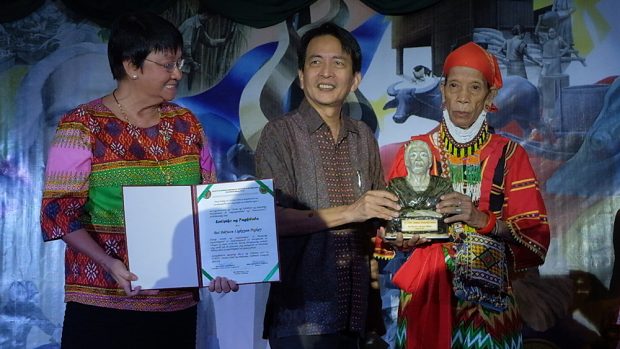
Offers back her flower bouquet
The audience was on its feet by the time Sr. Noemi reverently pronounced Bai Bibyaon Ligkayan Bigkay’s name to signify the award was about to be formally bestowed next. The honoree, who only speaks and understands the Talaingod Manobo language, was the last to stand up, seemingly unsure that the loud applause was for and about her. When she finally made her way onto the bedecked stage, she was uncertain on where to stand, looking at her companions, Sr. Noemi and fellow Manobo chieftain Datu Aylo Buntolan, as if asking why aren’t they joining her onstage. They later did. True to character, Bai Ligkayan did not smile even once, most unusual of any honoree in any awarding ceremony. The Bibyaon only had her iconic determined look, showing the reason why she is being honored–her resistance against all forms of abuse and exploitation against her people–is more a reason for struggle and less of celebration.
The text on the certificate was equally glowing. It said CSWCD’s 2017 Gawad Tandang Sora was being given Bai Ligkayan for her fight for the Lumad’s rights and dignity. Indeed, no one carries the Lumad struggle for human rights and self-determination with more dignity that Bigkay, more so when she raised her clenched fist for the assembled academics, students, officials, former CSWCD deans, staff and alumni of UP. Her iconic salute was borne by her people’s history of struggle at the other UP in the highlands of southern Mindanao.
The awardee only had a short speech as a response to the honor just bestowed her. Datu Aylo’s translation from Manobo to Visayan and Sr. Noemi’s translation from Visayan to English took more time. The awardee first remarked on her long name, which refers not only to her person but her people’s culture. She explained that her first name is “Ligkayan” and her family name is “Bigkay”. “Bai” is a dignified honorific to Mindanao women of stature while “Bibyaon” is her title by acclamation as her tribe’s chieftain, forced to lead when their Datus have died defending their land and people by government forces in the service of mining and logging interests decades ago. She is the Talaingod Manobo Bai and Bibyaon, who to this day leads her people against the same forces of injustice and death.
Ligkayan Bigkay thanked the CSWCD for the recognition of her contributions to her people’s struggles for self-determination. In the second part of her speech, the oldest person in the hall addressed herself to the youth and students present. She called on them to help the indigenous peoples defend the environment and the future as well as to contribute to the poor people’s struggles for social justice and liberation in the countryside.
Sr. Noemi struggled to capture and convey the depth of Bai’s words and admitted failure. “Let my deep sigh represent the depth of what she said,” the missionary nun said. She revealed that Bai Ligkayan is in fact being hunted by the military at the Pantaron Range exactly for the reasons that she is feted by the country’s premiere university.
After her speech, Ligkayan Bigkay went on showing the audience what her greatness was all about. When asked to pose for photos with her bouquet of flowers she did not want the moment to be all her own, just as she refused all the accolades given her in the past be about her alone. She reached out and took the hands of a person who always welcomed them on campus, their ally, the surprised Chancellor Tan, who was seated nearby.
“I was touched by the gesture. I believe she sees me either as a son or a fellow elderly. But it also means we are very good friends,” Tan said.
Earlier, when she stepped away from the podium and was being escorted back to her seat, the bouquet of flowers earlier given her was put back on her arms. She looked at them briefly and then offered it to Secretary Taguiwalo, a gesture that could only mean she is sharing the adulation being showered her with a kindred soul, a comrade, a fellow woman warrior. But Taguiwalo had to decline.
It was Taguiwalo who voiced how the audience felt. “The truth is, by receiving the award, Bai Bibyaon is bestowing us honor as a college,” Taguiwalo said. # (Report and photos by Raymund B. Villanueva)

